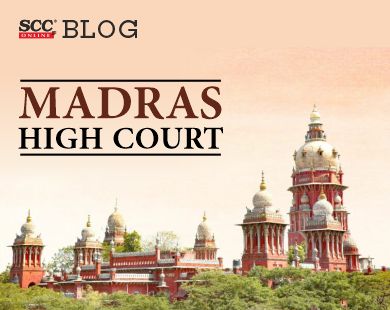Madras High Court: The full bench of P.N. Prakash, Teekaa Raman and A.D Jagadish Chandira, JJ. held that the jurisdiction under Article 227 of the Constitution will not be exercised, as a measure of self-imposed restriction, by-passing the statutory remedies under the D.V. Act. Further, it will be open to the respondent in a domestic violence case to appear in response to the notice and urge all such grounds, as may be open to him in law, before the Magistrate. If any party is aggrieved by an order passed by the Magistrate thereafter, he/she can pursue the remedy of a statutory appeal before the Sessions Court under Section 29 of the D.V. Act.
The Court decided the following two issues in the matter:
-
Whether a proceeding under Section 12 of the Domestic Violence Act, 2005 (‘DV Act’) can be challenged under Article 227 of the Constitution or under Section 482 of Code of Criminal Procedure, 1973 (‘CrPC’)?
-
Whether the aforesaid remedy is available to an aggrieved person before approaching the Magistrate and, if necessary, the Sessions Court, by way of an appeal under Section 29 of the D.V. Act?
Note: This post covers the second issue. The analysis of the first issue can be read here:
Dealing with the second question, the Court said that the power of judicial review under Article 227 of the Constitution is a part of the basic structure, and it cannot be taken away even by a constitutional amendment, let alone by a statute. Further, though this power of superintendence over the proceedings of the Magistrate under the D.V. Act exists, its exercise would, no doubt, be conditioned on certain salutary principles, like the High Court will not exercise this power if there exists an efficacious alternative remedy.
The Court said that the legislature has provided an appellate remedy, under Section 31 of the D.V. Act, before the Court of Session against an order of the Magistrate. The Court relied on Virudhunagar Hindu Nadargal Dharma Paribalana Sabai v. Tuticorin Educational Society, (2019) 9 SCC 538 and said that the existence of an appellate remedy would almost always be a “near total bar” for exercising power under Article 227.
Further, the Court took note of P. Pathmanathan v. Tmt. V. Monica, 2021 SCC OnLine Mad 8731, and said that the Sessions Court, hearing an appeal under Section 29 of the D.V. Act, does not function as a Court of appeal under Chapter XXIX of the CrPC. It is elementary that an appeal is a continuation of an original proceeding. Thus, if an original proceeding bears a civil character, it is impossible to term an appeal arising out of such a case as a criminal proceeding. Thus, against the order of the Sessions Court, neither a revision to the High Court under Section 397 CrPC. nor a petition under Section 482 CrPC. is maintainable. However, a remedy under Article 227 would be available in an appropriate case.
Moreover, the Court while answering, whether a proceeding under the D.V. Act before the Magistrate could be transferred to a Civil or Family Court in exercise of powers under Section 24 of the Code of Civil Procedure, 1908 (‘CPC’) or under Article 227 of the Constitution, said that there are contrary views of various High Courts on this issue, and the legislature has not provided for transfer of cases under the D.V. Act.
The Court said that the legislative scheme of the D.V. Act clearly envisages two independent proceedings:- proceedings before the Magistrate under Section 12 of the D.V. Act and proceedings before a Civil Court, Family Court or a Criminal Court, as mentioned in Section 26 of the D.V. Act.
Further, Section 26(1) of D.V Act is an enabling provision that facilitates a remedy for the aggrieved person under Sections 18-22 in any legal proceeding pending before the civil, criminal or the Family Court and does not enable the High Court to effect a transfer in an appropriate case. Thus, it is evident that Section 26(1) does not confer any original jurisdiction on a Civil, Criminal or Family Court to entertain an application under Section 12 of the D.V. Act. Similarly, Section 26(2), enables the aggrieved person to seek the reliefs under Sections 18-22 of the D.V. Act, in any proceeding she may seek before the Civil or Criminal Court.
The Court noticed that Section 26(1) refers to “Civil Court, Family Court or a Criminal Court”, whereas Section 26(2) refers to “Civil or Criminal Court”, but as Sections 26(1) and (2) serves a common object i.e., to prevent multiplicity of proceedings, therefore, it viewed that Section 26(2) must be construed as including the Family Court as well.
Thus, it was held that the jurisdiction to entertain and decide a complaint under Section 12 must be reckoned with reference to Section 27 of the D.V. Act alone and Section 26, applies only if the reliefs under Sections 18-22 of the D.V. Act are sought in other legal proceedings.
Thus, a Family Court or the Civil Court cannot entertain an application under Section 12 of the DV Act, as the court, designated under Section 27 of the D.V.Act, is the Court of the Magistrate and it would be equivalent to doing violence to the plain language of this provision by telescoping Section 26 into it.
The Court upheld Pathmanathan (supra) and overruled P. Ganesan (supra), S. Gowrishankar v. Deepa, 2014 SCC OnLine Mad 12443, Sathiyaseelan v. Preethi, 2018 SCC OnLine Mad 7641. G. Jayakumar v. Jayanthi, Crl.OP No. 17235 of 2016, Mohana Seshathri v. E. Anuja 2021-2-LW 509 following to the extent that they are contrary to the view taken herein.
[Arul Daniel v. Suganya, 2022 SCC OnLine Mad 5435, decided on 17-11-2022]
*Apoorva Goel, Editorial Assistant has reported this brief.



